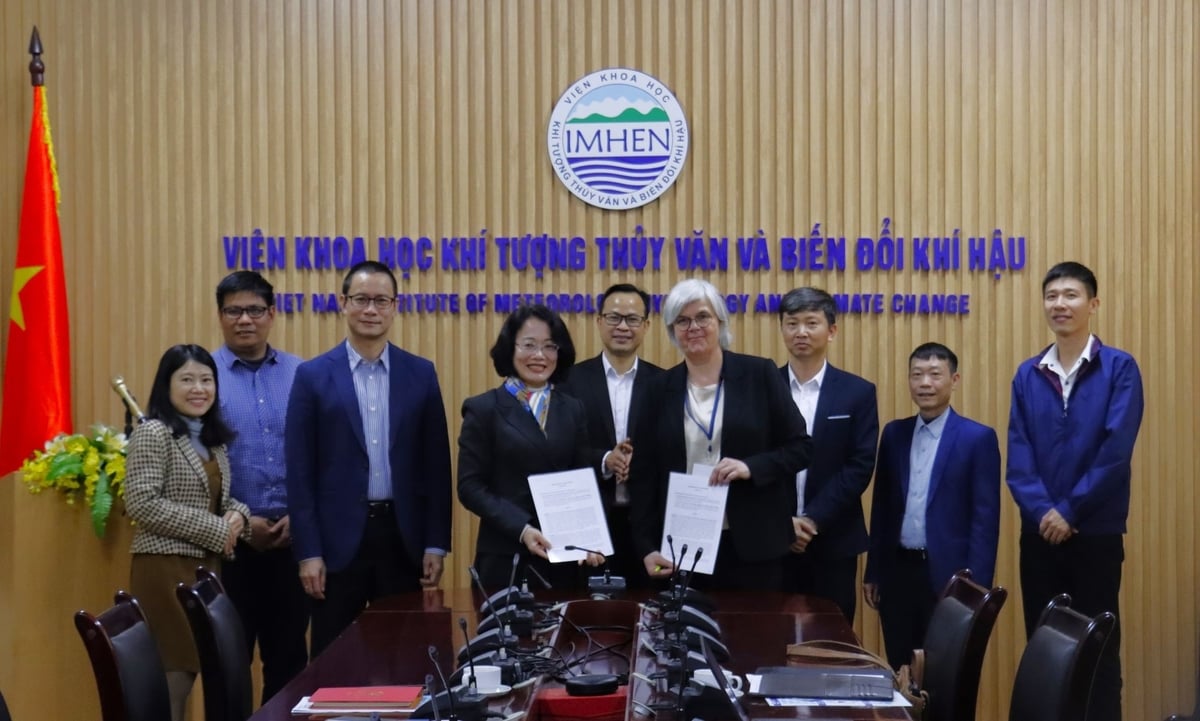November 25, 2025 | 18:06 GMT +7
November 25, 2025 | 18:06 GMT +7
Hotline: 0913.378.918
November 25, 2025 | 18:06 GMT +7
Hotline: 0913.378.918
As part of the official visit of the King and Queen of the Kingdom of Belgium to Vietnam, on March 31, the Institute of Meteorology, Hydrology, and Climate Change (Ministry of Agriculture and Environment) and the Flanders Innovation and Technology Organization (VITO) from Belgium signed and announced a Memorandum of Understanding (MOU) for cooperation between the two organizations.
The MOU will be effective from April 1, 2025, for a duration of three years, with the possibility of extension through a written agreement between the two parties.

Assoc. Prof. Dr. Pham Thi Thanh Nga, Director of the Institute of Meteorology, Hydrology and Climate Change, and Mrs. Leen Govaerts, representative of the Flanders Innovation and Technology Organization (VITO) (Belgium), exchange the Memorandum of Understanding between the two organizations. Photo: Trung Nguyen.
According to Assoc. Prof. Dr. Pham Thi Thanh Nga, the two organizations will work together on scientific research and the development of groundbreaking solutions across key areas. These include urban climate research, where they will apply high-resolution models to study urban flooding, climate risks, and develop systems for monitoring and warning about urban climate risks. Additionally, they will focus on reducing greenhouse gas emissions by developing advanced technologies for renewable energy and carbon capture that are tailored to Vietnam’s specific conditions. Another important area of collaboration will be water resource management, where they will work on building smart monitoring and forecasting systems for major river basins.
The implementation of the Vietnam-Belgium cooperation in scientific research will also bring many practical benefits. Specifically, it will involve developing high-resolution urban climate change scenarios; providing climate services to support decision-making in the face of extreme phenomena such as urban flooding, high temperatures, climate risks, and urban pollution; establishing urban climate risk monitoring and early warning systems in Vietnam; creating pilot models for smart cities and smart agriculture that are adaptive to climate change; and enhancing the capacity for disaster forecasting and early warning on a national scale. The two parties will also work on developing climate change adaptation solutions for key economic sectors such as agriculture, fisheries, and energy; applying 4.0 technologies (artificial intelligence - AI, the Internet of Things - IoT, and big data) for environmental and climate monitoring.
In terms of training, the cooperation will focus on the development of high-quality human resources through the exchange of experts and research fellows. Additionally, it will offer short-term training programs on advanced technologies and facilitate the transfer of valuable knowledge and management practices.
Ms. Leen Govaerts, Director of the Energy and Water Division at the Flanders Research and Technology Organization (VITO), emphasized that, beyond the primary areas of collaboration, both parties will remain flexible in expanding their cooperation to include new topics based on real-world needs and the strengths of each side. The Institute of Meteorology, Hydrology, and Climate Change (IMHCC) and VITO will also actively collaborate in identifying and securing international funding sources.
To ensure the success and effectiveness of their collaboration, both organizations will establish a strong working framework, maintain regular communication and information exchange, and develop specific agreements tailored to each project.
Translated by Phuong Linh

(VAN) Deputy Minister Nguyen Quoc Tri emphasized the determination to prevent violations at CoP20, sharing enforcement results and commitments to strengthen cooperation with the international community in the coming period.

(VAN) In addition to strengthening the relationship between schools and enterprises, the Aus4Skills project expands opportunities for female students and people with disabilities to work in the transport and logistics sector.

(VAN) Nghe An is preparing policy, technical, and resource steps to participate in the forest carbon credit market.
/2025/11/25/1648-2-110733_532.jpg)
(VAN) From 2011 to 2023, Ca Mau province lost approximately 6,200 ha of coastal land and protection forests due to erosion, threatening many residential areas, infrastructure facilities, and production zones.

(VAN) Quang Ngai holds strong potential for carbon credits but needs a clear legal and policy framework to secure sustainable revenue from this resource.

(VAN) With its diverse ecosystem, Phu Quoc National Park plays a vital role in environmental protection and biodiversity conservation and serves as the core zone of the Kien Giang World Biosphere Reserve.

(VAN) Cooperation activities under the Aus4Skills program focus on: logistics professional development, competency-based training and assessment (CBTA), leadership innovation, and digitalization.